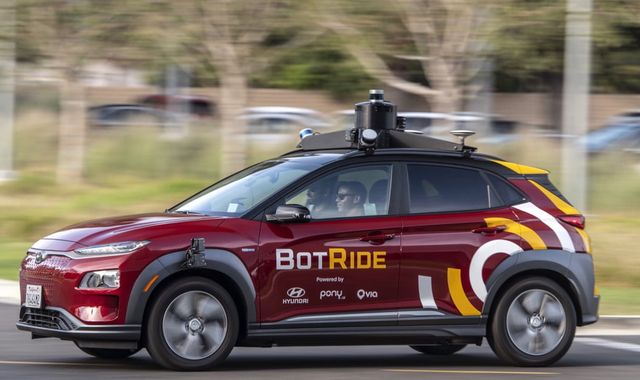The latest automaker to experiment with autonomous ride-hailing
Hyundai will launch a free ride-hailing service with a fleet of autonomous electric cars in Irvine, California, starting on November 4th. The news comes after the South Korean automaker announced that it would invest $35 billion in autonomous and electric vehicle development over the next five years.
Hyundai is partnering with AV startup Pony.ai and ride-hailing service Via for the free taxi service. Interested riders can hail a self-driving car via a smartphone app. The cars won’t be fully driverless; Hyundai says a safety driver will be behind the wheel, and there will also be an additional engineer in the passenger seat. The vehicles will be constrained to a geofenced area in Irvine that covers “several residential, commercial, and institutional points of interest,” the automaker says.
The vehicles — all-electric Hyundai Kona SUVs — are equipped with Pony.ai’s latest sensor hardware and proprietary software to help “identify the precise position of surrounding vehicles, handle pedestrian traffic in urban areas, accurately monitor its surroundings, predict the behavior of other road users, and precisely plan actions accordingly,” Hyundai says.
Hyundai is the latest automaker or tech company to announce a self-driving taxi service. Toyota plans to offer one in Tokyo to coincide with the 2020 Summer Olympics. Ford has said it will launch an autonomous ride-hailing service in the US “at scale” starting in 2021. GM recently pushed back the launch date of its taxi service to beyond 2019. AV startup Zoox will offer rides in its AVs in Las Vegas. Didi Chuxing is preparing to do the same in China starting in 2021.
Unlike some of its competitors, Hyundai receiving government backing in South Korea to boost its efforts in the AV and EV space. According to Reuters:
The government intends to spend 1.7 trillion won between 2021 and 2027 on self-driving technology. It expects Hyundai to launch level 4, or fully autonomous, cars for fleet customers in 2024 and for the general public by 2027, an industry ministry official told Reuters.













![Hotstar Premium Cookies 2019 [*100% Working & Daily Updated*] Hotstar Premium Cookies 2019 [*100% Working & Daily Updated*]](https://tahav.com/wp-content/uploads/2019/11/Hotstar-Premium-Cookies-Free-100x70.jpg)



